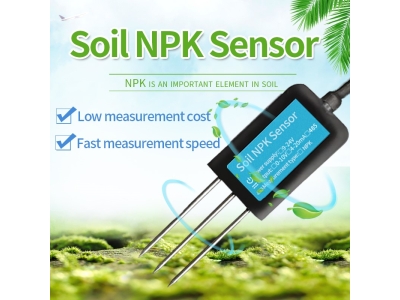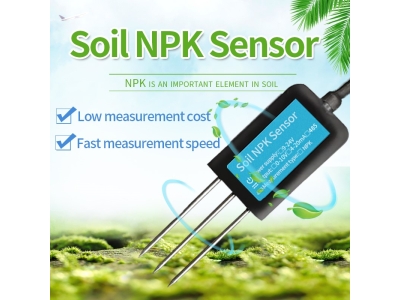Agriculture is a vital industry that feeds the world's growing population. With the increasing need for sustainable and efficient farming practices, technology has played a pivotal role in transforming agriculture. One such technological advancement is soil sensor technology. Soil sensors provide real-time data on various soil parameters, enabling farmers to make informed decisions about irrigation, fertilization, and other agricultural practices. In this article, we will explore how soil sensor technology is revolutionizing agriculture and its potential impact on future food production.
Real-Time Monitoring:
Traditionally, farmers relied on manual soil sampling and laboratory testing to assess soil conditions. This approach was time-consuming and provided only limited information. Soil sensors, on the other hand, allow continuous monitoring of critical soil parameters such as moisture content, temperature, pH levels, and nutrient concentrations. By providing real-time data, soil sensors enable farmers to make timely decisions regarding irrigation scheduling, fertilizer applications, and other essential practices. Real-time monitoring helps optimize resource utilization, improve crop yield, and reduce environmental impact.

Precision Agriculture:
Precision agriculture is a farming approach that aims to maximize crop productivity while minimizing the use of resources. Soil sensors are instrumental in implementing precision agriculture techniques. By providing accurate and detailed information about soil conditions, these sensors allow farmers to apply inputs, such as water and fertilizers, precisely where and when they are needed. This targeted approach minimizes waste and ensures optimal nutrient availability for plants. Precision agriculture, guided by soil sensor data, improves crop yield, reduces costs, and promotes sustainable farming practices.
Irrigation Management:
Water scarcity is a significant challenge facing agriculture globally. Efficient irrigation management is crucial for conserving water and ensuring optimal plant growth. Soil sensors play a crucial role in irrigation management by continuously monitoring soil moisture levels. This data helps farmers determine the ideal timing and amount of irrigation required for crops. By avoiding overwatering and underwatering, farmers can optimize water usage, prevent soil erosion, and reduce nutrient leaching. Soil sensor technology enables precise irrigation management, contributing to sustainable water resource management in agriculture.
Nutrient Management:
Nutrients, such as nitrogen, phosphorus, and potassium, are essential for plant growth. However, improper nutrient management can lead to environmental pollution and decreased crop productivity. Soil sensors provide valuable insights into nutrient availability in the soil. By measuring nutrient concentrations, these sensors help farmers determine the optimal amount and timing of fertilizer applications. This targeted approach minimizes nutrient runoff, reduces groundwater contamination, and improves nutrient uptake by plants. Effective nutrient management based on soil sensor data enhances crop health, reduces environmental impact, and promotes sustainable farming practices.
Disease and Pest Management:
Soil health plays a critical role in determining the prevalence of diseases and pests in agricultural systems. Soil sensors aid in early detection and monitoring of soilborne pathogens and pests. Changes in soil properties detected by sensors can indicate the presence of diseases or pest infestations. By providing timely information, soil sensors enable farmers to implement appropriate control measures, such as targeted pesticide applications or crop rotation. This proactive approach minimizes crop losses, reduces reliance on chemical inputs, and promotes sustainable pest management practices.
Environmental Monitoring:
Agriculture's impact on the environment is a growing concern worldwide. Soil sensors contribute to environmental monitoring efforts by providing valuable insights into soil erosion, nutrient runoff, and soil compaction risks. Continuous monitoring of soil conditions helps identify areas prone to erosion, allowing farmers to implement conservation practices such as contour plowing or cover cropping. By minimizing soil erosion and nutrient runoff, soil sensor technology supports environmental sustainability and protects water quality. Furthermore, soil sensor data facilitates the adoption of sustainable land management practices, reducing the ecological footprint of agriculture.
Future Potential:
As technology continues to advance, soil sensor technology holds immense potential for further transforming agriculture. Integration with other technologies, such as satellite imaging and machine learning, can enhance the predictive capabilities of soil sensors. By analyzing large volumes of data, these integrated systems can provide farmers with personalized recommendations for optimiz






